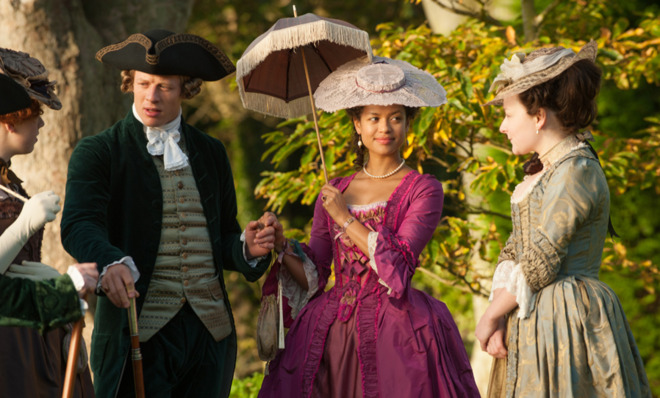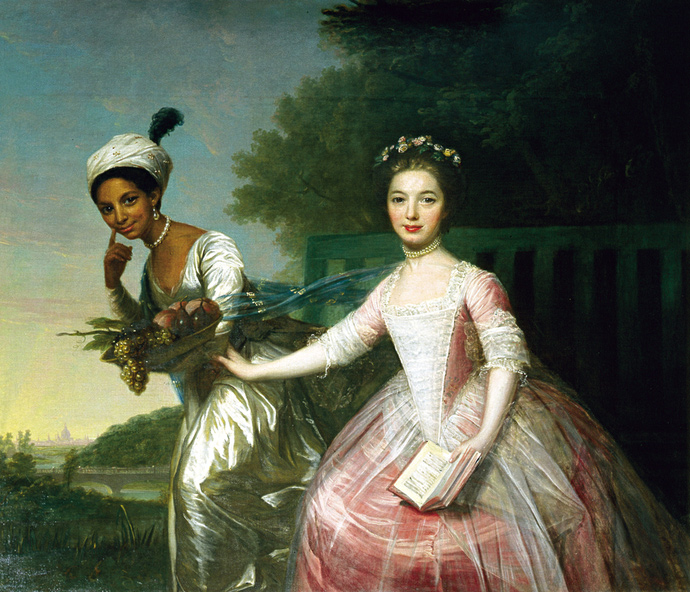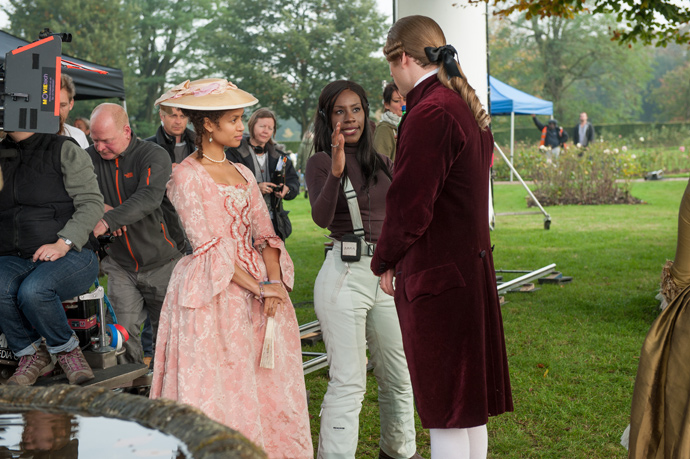Girls on Film: Belle is one of the most groundbreaking, joyous movies of the summer
The indie hit, which arrived on DVD this week, broke the status quo by bringing a little-known true story into the light


A free daily email with the biggest news stories of the day – and the best features from TheWeek.com
You are now subscribed
Your newsletter sign-up was successful
For many years, Dido Elizabeth Belle was an enigma immortalized in a painting. Though she looked confidently from the canvas — on equal footing alongside Lady Elizabeth Murray — she was presumed to be a servant. People assumed she couldn't possibly be anything more than that at a time when Britain was entrenched in the slave trade, some 200 years after Queen Elizabeth strove to rid London of the rising "Blackamoor" population, and some 200 years before racial identities started to significantly blur in Britain.
The story changed in the 1970s and '80s, however, when research into London's Kenwood House revealed that Dido was no servant, but rather one of the nation's first mixed-race aristocrats, whose story had been lost during a century of false assumptions. In fact, Dido wasn't merely a historic anomaly; she was a forgotten link in Britain's Age of Enlightenment: a close confidant of her uncle, the first Earl of Mansfield and a Chief Justice who played a significant role in ending Britain's slave trade.
It would take another 30 years for her story to spread, but she has finally been captured on film in Amma Asante's thoughtful, accomplished period piece Belle, available on DVD and Blu-Ray this week.
The Week
Escape your echo chamber. Get the facts behind the news, plus analysis from multiple perspectives.

Sign up for The Week's Free Newsletters
From our morning news briefing to a weekly Good News Newsletter, get the best of The Week delivered directly to your inbox.
From our morning news briefing to a weekly Good News Newsletter, get the best of The Week delivered directly to your inbox.

Unfortunately, Dido's real life lives on only in the painting and a collection of brief notes and ledgers. However, the scraps show a life that defied convention. Dido was not treated as an equal to her white cousin, but she was nowhere near the low stature usually given to biracial illegitimate children. She was a trusted friend of Lady Elizabeth, and doted on by Lord Mansfield. Her family's reverence instigated reproach in their community, but Dido was beloved, named in their wills, and cared for until her young death at 43.
This mix of historical relevance and mystery makes her story the perfect subject for a period piece — one free of the preconceptions that come with the umpteenth Jane Austen adaptation or other forays into wigs and regal decorum. Free of rigid expectations and genre tropes, Belle breathes new life into the old form. It is the rare story never seen before, with themes that are (sadly) still relevant today.
Belle follows Dido (Gugu Mbatha-Raw) as a young woman, long after her father asked his uncle to care for her, explaining that she was his "blood." She doesn't dine with her family, and is keenly aware of her difference in the household, but she is otherwise cherished. That is, until her relatively carefree world is challenged when confidant Elizabeth (Sarah Gadon) prepares to head out into the world and find a husband, and Lord Mansfield faces a controversial slave trade case (The Zong Massacre).
Dido begins to feel the true isolation of her position, which Mbatha-Raw plays beautifully in a star-making turn. She does not have the freedom to court suitors like Elizabeth, and faces additional scorn as aristocrats sneer at her place in the Mansfield family. Her discomfort is amplified by the discovery of her uncle's work on the massacre, and the idea that he might judge it legal for traders to throw living slaves into the sea in order to collect insurance money.
A free daily email with the biggest news stories of the day – and the best features from TheWeek.com
As Dido struggles with her ideological distance from those she loves, Asante cleverly plays with the ever-wavering limitations of this racist society. Her family ultimately embraces her, but they don't extend that attitude to other people of her race. Her cousin Elizabeth loves her, but grows increasingly distrustful. Most cuttingly, the family that sneers at her ultimately offers a proposal of marriage, all because her inheritance trumps their opinions about her race.
Belle strives to understand what it would be like for this woman, torn between love and idealism. But despite the density of the subject matter, this is not a grim drama. Indeed, Asante — a woman who loves period pieces and was once developing a Jane Austen adaptation herself — keeps the proceedings light.

"If I'm honest," she told Women and Hollywood, "I wanted to show a woman of color being loved. We don't see it that often. I wanted to change the conversation a little bit, change the dialogue a little bit — we are loved, [and] we can be loved."
Many reviews — even the positive ones — note the lack of complexity in Belle's narrative, and some even question Asante's decision to make Dido's story a light period drama, rather than offer the heart-wrenching pain of a film like 12 Years a Slave. It's a curious complaint, and one that speaks a lot more to our expectations regarding race in film than Asante's directorial choices. Instead of digging into the horrific depths of the slave trade, as other films have, or putting her heroine through hell for dramatic fulfillment, Asante wanted to show love — not flawless, cinematic love that ignores history, but a real and fascinating instance of love that defied convention during a time of high racial tension.
Just as Dido's rediscovered existence begins to expand our knowledge of racial history, Asante's film strives to expand what period dramas can be. It shines a light on our cultural heritage by offering a real figure that inspires women today, while allowing a female filmmaker of color to show the beautiful power of women who defy expectation.
It is a narrative that fits Asante as well. After spending part of her adolescence on BBC's Grange Hill, she wrote a script about a teen mother struggling to make ends meet. She had no intention of directing it; she was a writer. Then a funder at the BFI asked her to direct it, and when confronted with her fears about ruining the script with her inexperience, she was sent to film school and given money to shoot a few scenes and get the hang of directing. After shooting the pilot that would become her debut, A Way of Life, Asante realized: "'Wow, I really like this.' Being able to create the characters and then see it through, it felt like this is what I was born for."
In a world where established female filmmakers struggle to get funding and keep their careers alive, Asante found her calling through her funder's faith in her talent, and willingness to help her learn what she needed to be a success. Belle is the result of a project that struggled to become a reality, and was finally realized by a talented woman of color whose skill is the result of mentorship and support.
Further reading on Dido and her history:
"Dido Belle: The artworld enigma who inspired a movie"
"Dido Elizabeth Belle: A black girl at Kenwood – An account of a protegee of the 1st Lord Mansfield"
"Belle: Was British history really this black and white?"
"Dido Belle: Britain's first black artistocrat"
Girls on Film is a weekly column focusing on women and cinema. It can be found at TheWeek.com every Friday morning. And be sure to follow the Girls on Film Twitter feed for additional femme-con.
Monika Bartyzel is a freelance writer and creator of Girls on Film, a weekly look at femme-centric film news and concerns, now appearing at TheWeek.com. Her work has been published on sites including The Atlantic, Movies.com, Moviefone, Collider, and the now-defunct Cinematical, where she was a lead writer and assignment editor.
-
 The 8 best TV shows of the 1960s
The 8 best TV shows of the 1960sThe standout shows of this decade take viewers from outer space to the Wild West
-
 Microdramas are booming
Microdramas are boomingUnder the radar Scroll to watch a whole movie
-
 The Olympic timekeepers keeping the Games on track
The Olympic timekeepers keeping the Games on trackUnder the Radar Swiss watchmaking giant Omega has been at the finish line of every Olympic Games for nearly 100 years
